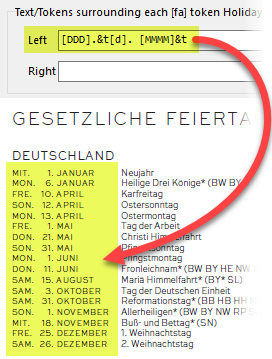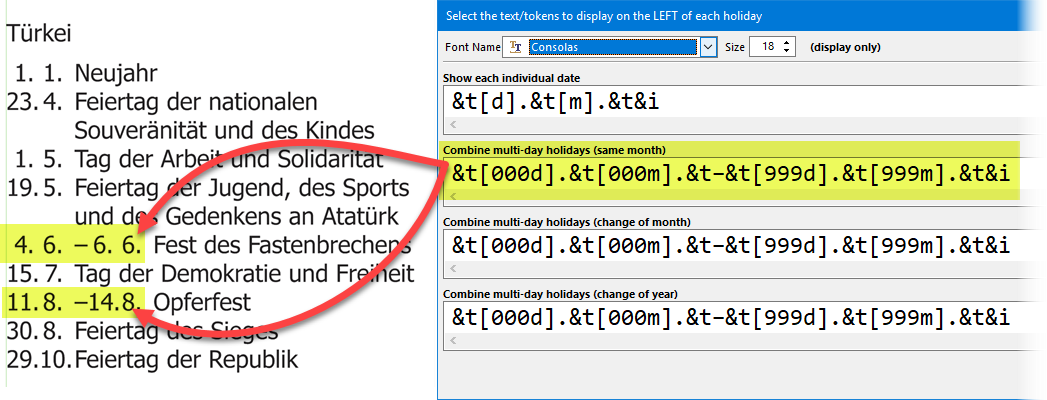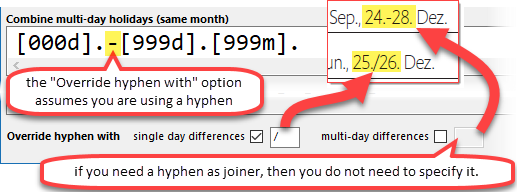
•Usually, you should not include a LanguageTag and/or DayValue in the tokens that you place here. The LanguageTag and DayValue of the originating holiday name token will automatically be assumed. For example, if the original token was [6fa], then the use of [d] [ddd] [mmm] in the text surrounding the holiday name would be treated as [a6d] [a6ddd] [a6mmm].
•If you do specify a LanguageTag in the tokens here, then this LanguageTag will override the LanguageTag of the originating holiday name token (and then you will need to specify a DayValue, usually 1, to use the DayValue of the originating token).
•If you do specify a DayValue in the tokens here, then this DayValue will override the DayValue of the originating holiday name token.
•As always, any underscore character "_" (without the quotes) contained in this string will be replaced by a non-breaking space.
•You can use macro tokens (and then you will need to specify a DayValue, usually 1, to use the DayValue of the originating token).
•You can mix special character markers with the tokens.
•You can use recursive tokens.
Overriding LanguageTags or DayValues
As mentioned, usually, you would not include a LanguageTag and/or DayValue in the tokens that you place here, but in some cases, it might be required.
•If some of the tokens you wish to display here depend on language (such as the [ddd] and [mmm] tokens) you should use a LanguageTag in the original token, for example using [b6fa] as holiday token to ensure that the surrounding tokens get converted to [b6d] [b6ddd] [b6mmm].
•If you wish to use a different language than the language of the original token (for example c instead of b) then you must include a DayValue of 1 to your token, that is to say, use [c1ddd], instead of [ddd], for example.
•The same is true if you need to add a macro to the tokens before/after each holiday. In such cases, the DayValue 1 should be used, that is to say, the incorrect token [*2ddd] should instead be [1*2ddd], otherwise a run-time error message will be generated.
Using Holidays Tokens
You also can use holidays tokens in the text surrounding the holiday name.
•To avoid infinite recursion, this text is only added to occurrences of holidays from the original token. So, for example, if you had an [5fa] token that you wished to surround to the right by [fâ], the original occurrences of [5fa] would be surrounded on the right by [fâ], but that inserted [fâ] token would not in turn be surrounded on the right by another [fâ]token.
•If you wish to display a holiday symbol near each occurrence, you should use the property holidays (display).
Clicking on the ellipsis button at the right of the left and right text fields, displays the dialog shown below, which is used to specify text and/or tokens surrounding each holiday occurrence, and, depending if the holiday lasts one or more days and, in the latter case, if that period is all in the same month or not (the idea is similar to MonthHeaders).

Note that you can force holidays to appear with the same name, regardless of the conditions, such as it appearing on a day in lieu, using the ALWAYS holiday name variation.
Combine multi-day holidays
In these 3 fields that let you specify "combined" text and tokens sequences, you should:
•use the DayValue 000 to indicate the minimum date of the multi-day holiday
•use the DayValue 999 to indicate the maximum date of the multi-day holiday.

Note that, the text editor changes, as shown below, as soon as one of the 3 multi-day fields is non-blank.
Override hyphen with

➢the "Override hyphen with" option assumes you are using a hyphen where you specify text and/or tokens surrounding each holiday occurrence.
➢if you need a hyphen as joiner, then you do not need to specify it (but you can, if you prefer, for clarity).
In the example on the right, 2-day periods are separated with a front-slash "/", while periods spanning more than 2 days are separated with a hyphen "-".
See also: concatenating holidays dates with a macro, examples of the use of the holidays (display/multiple) properties.
Topic 107088, last updated on 05-Nov-2025